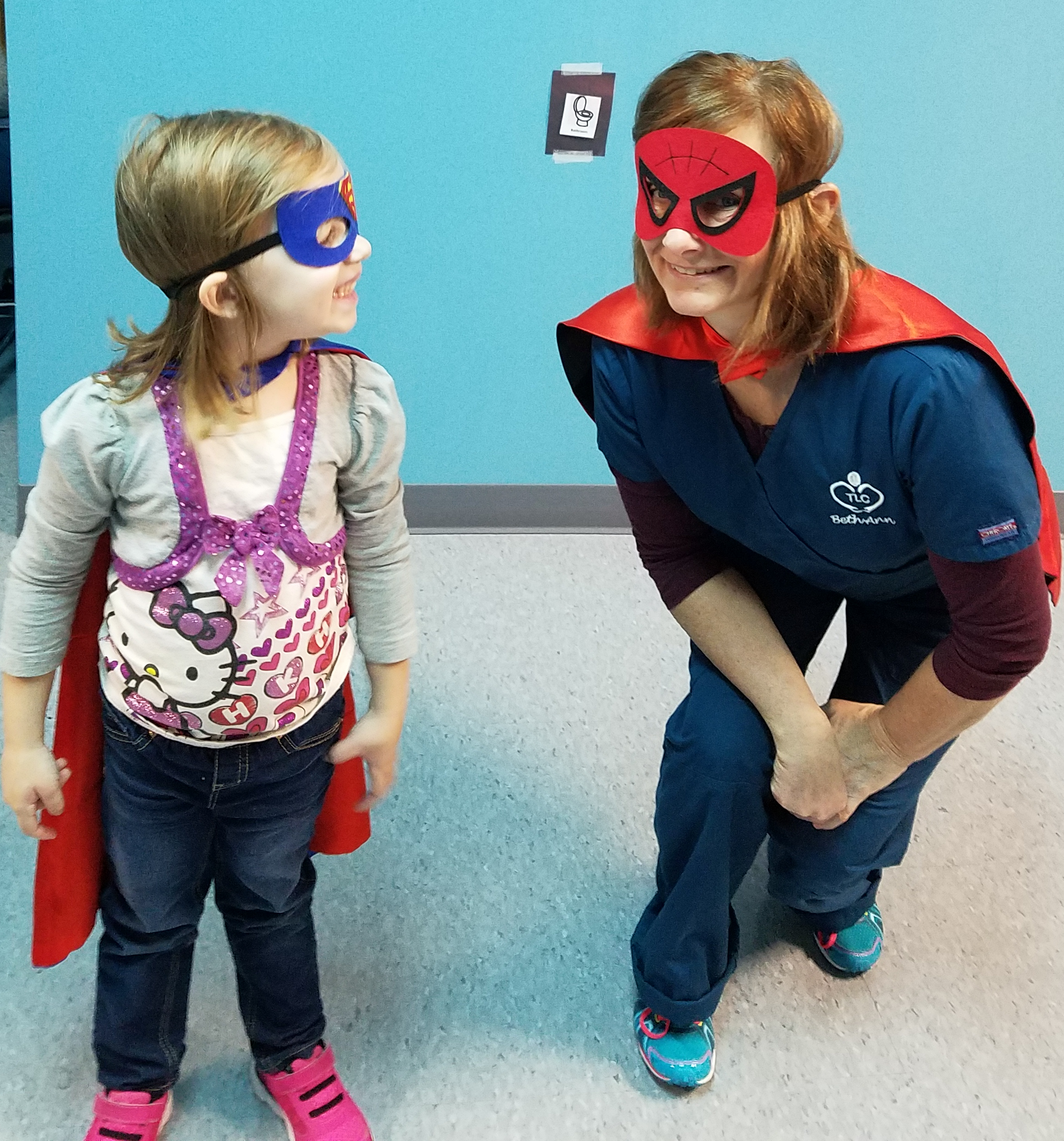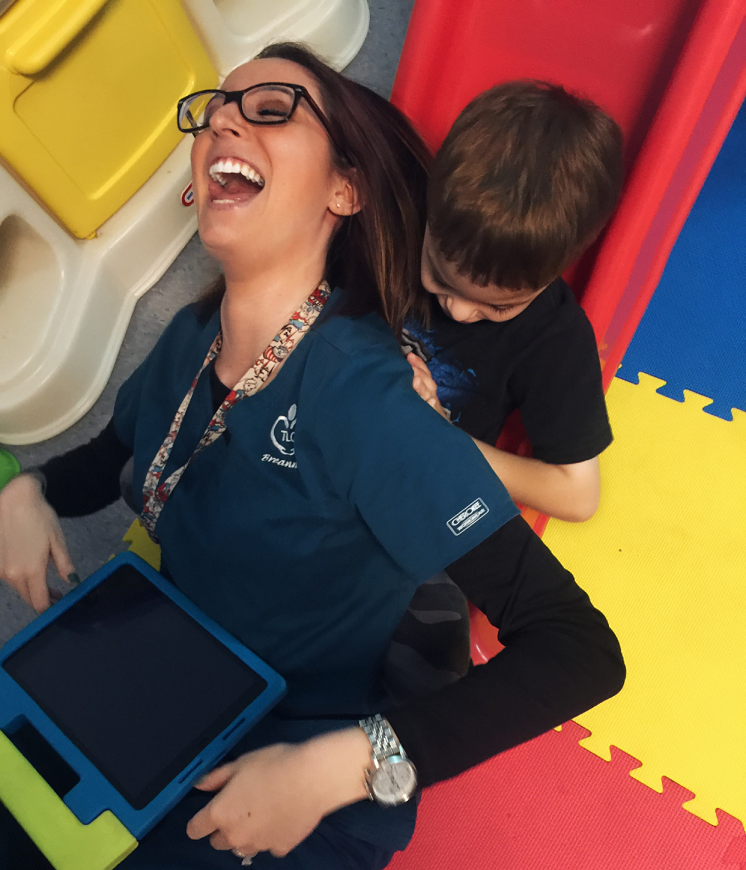What is ABA?
Applied Behavior Analysis (ABA) is a therapy based on the science of learning and behavior. ABA helps us understand how behavior works, how behavior is affected by the environment, and how learning takes place for an individual. ABA therapy applies our understanding of how behavior works to real situations. The goal is to increase behaviors that are helpful for the individual’s success, and decrease behaviors that are harmful or negatively affect learning and quality of life for the individual. ABA therapy is flexible, and can be tailored to meet the needs of each individual receiving it.
The Center for TLC has a very modern and informed approach to ABA therapy. We continuously educate our staff on Autism Spectrum Disorders and related Disorders to ensure we continuously provide up to date and evidenced based treatment. We are aware of varying concerns or opinions about ABA Therapy and are dedicated to making our clients and their families feel comfortable, heard, and understood. Our staff at the Center for TLC will never force your child to “act normal” or punish them for the way they exist. Our goal is to assist each child in growing and achieving their maximum potential in a way that works for them and their families needs.

ABA Therapy Programs can help:
-
Increase Language, Teach Functional Communication: communicating needs/wants to others
-
Improve Attention, Focus, and Memory.
-
Self-Help and Independence Skills: Skills such as dressing, grooming, feeding, toilet training
-
Gross/Fine Motor Skills: Strength, Balance, and Body Movement
-
Learning and Academic Skills
-
Play skills and Social Skills
ABA utilizes positive reinforcement methods to increase behaviors that benefit the individual and decrease potentially harmful behaviors such as self-injury, aggression, and/or behaviors that may distract from learning. ABA teaches functional replacement behaviors and coping skills that allow the child to have their unique needs met, while promoting learning and growth.
Program Information
The Center for TLC's program provides one-on-one therapy in a center-based environment. Typical hours are either from 9am-12pm or 1pm-4pm, Monday-Friday. Some evening hours are offered depending on the child’s age and whether or not they attend school. Schedules may be modified based on the recommendations of the BCBA (Board Certified Behavior Analyst), pending the type of treatment that will be most effective. Each child will be assessed using a language/educational-based assessment tool, depending on the child’s needs. Goals are developed based on skills deficits, as well as child and family needs, which are the focus of the 1:1 therapy session. Group skills are also emphasized to increase social/peer interactions, as well as attention to tasks in a group (rather than only 1:1) environment.
Staff
Board Certified Behavior Analyst (BCBA)
The BCBA is responsible for conducting the initial evaluation/assessment, program development, parent training, and overseeing the program for each specific child. This includes direct supervision of staff implementing any behavior program. A BCBA must obtain at least a Master’s degree and have taken the exam to become Board Certified.
Technician Supervisors
Technician Supervisors have obtained their Registered Behavior Technician credential and assist in the daily operations of running our ABA program. They have extensive experience in providing one-on-one services and are great resources for our staff. Some of their responsibilities include providing feedback to behavior technicians on their performance, assisting our BCBA's with programming tasks as needed, maintaining our daily schedule, and collaborating with our clinical team to ensure continuous quality improvement throughout our program. They also work one-on-one with our clients as the need presents itself.
Lead Technicians
Lead Technicians maintain a full caseload of working one-one-one with our clients. In addition to their duties as a behavior technician, they assist the BCBA's on projects related to their clients or the center as a whole. They act as a go-to staff members on the floor who can assist with questions or concerns right on the spot, and also assist with new hire training.
Behavior Technicians
Behavior Technicians at TLC work one-on-one with the clients in our ABA program. Our Behavior Technicians oftentimes have a Bachelor’s Degree in Psychology, Education, or a related field. Typically, they will have had prior positions working in the ABA field, or have extensive experience working with children in some capacity. Behavior Technicians receive intensive training in which they complete the BACB certified coursework and exam, which leads to the Registered Behavior Technician (RBT) credential. Initial training and ongoing, continuous oversight is provided by our Board Certified Behavior Analysts and Technician Supervisors.
Teaching Methodologies include:
- Data-based Decision Making
- Positive Reinforcement
- Individualized Curriculum
- Generalization
- Behavior Reduction Procedures
- Parent Involvement
- Parent involvement is a key component to the success of any ABA program. The best way to get started with this process is to research what ABA it and how it can effectively be utilized at home. Families are encouraged to observe their child’s therapy sessions, and implement lessons at home to increase the child’s skill acquisition rate, establish consistency, and promote generalization. Homework will often be provided to families to encourage involvement across environments.

TLC Academy
What Is Academy?
TLC Academy is available to children currently enrolled in ABA services. It is a transition program that has been developed to help facilitate your child with the transition from one-on-one ABA services to a group-structured classroom setting. The transition to school is often a challenge, likely because the skills needed to be successful in a group setting are not being developed in a one-on-one setting. The function of the Academy program is to provide children with the opportunity for growth in the areas of classroom readiness skills, socialization, and communication in a group setting.
TLC Academy Structure
TLC Academy is as structured as a typical classroom. All curriculum is written and developed by a special education teacher who consults with our Academy teachers to target specific classroom readiness skills. Each child will have a set of individualized transition goals to help prepare for school. TLC Academy is a transition to school program with the goal of an educational placement.
Transition Assessment and Quarterly Conferences
During the first week of TLC Academy, a transition assessment will be administered to determine your child's current level of performance in the following Criteria: working with others, classroom readiness, time management, social/emotional behavior, safety awareness, and leisure activities. The team will discuss barriers specific to your child of being independent in a lesser restrictive setting and will create goals for your child that will be targeted in the classroom. The team will frequently collaborate to ensure that your child is being taught in the most optimal way. Your child's progress will be monitored throughout the course of TLC Academy and a transition assessment will be administered quarterly.
Program Info
Academy
Structured as a typical classroom and run by a special education teacher. Each child has individualized transition goals to help prepare for school Teacher, transition coordinator, BCBA and parents collaborate regularly regarding goals and progress of the child. Goal is to transition child to lesser restrictive environment with same-aged peers in local school setting. It is a 1 year program at 3 hours per day, 5 days a week.
Junior Academy
Structured as a typical classroom and run by a special education teacher. Each child has individualized transition goals. Teacher, BCBA and parents collaborate regularly regarding goals and progress of the child. It is a 1 hour program that increases to 1.5 hours halfway through the school year. Students work on getting acclimated in a group setting and learn basic foundation skills of a functioning classroom. Students may be able to transfer to Academy after 1 year or they may require more time in Junior Academy.
Group
Run by special education teacher. It is a 15 minute program that increases to 30 min halfway through the school year. Students explore classroom materials at their own pace. Students learn beginning concepts of being in a group and following group instructions. Each child has individualized classroom goals.
Autism Resources:
About autism - autistic self advocacy network:
https://autisticadvocacy.org/about-asan/about-autism/
What is autism - National Autistic Society:
https://www.autism.org.uk/advice-and-guidance/what-is-autism